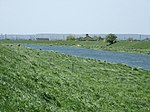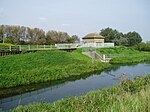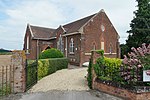Gosberton Clough is a village in the civil parish of Gosberton and the South Holland district of Lincolnshire, England. It is 30 miles (50 km) south-east from the city and county town of Lincoln, 5 miles (8 km) north from the nearest large town of Spalding, and 3 miles (5 km) west-southwest from parish village of Gosberton.Gosberton Clough and the village Risegate to the east are conjoined as a 2 miles (3 km) linear settlement on the east to west B1397 road which runs along the south side of Risegate Eau (drain). Within Gosberton Clough the B1397 is named 'Clough Road', and in Risegate, 'Risegate Road', the villages separated at a bridge over the Risegate Eau at the junction with Chesboule Lane, running north, and Beach Lane, running south. The B1397 and the village is mirrored at the north of Risegate Eau by the parallel 'Siltside' (road). The Risegate Eau starts 2 miles (3 km) west at the South Forty-Foot Drain, then flows through the village, and reaches the River Welland at the Risegate Outfall sluice in Algarkirk Marsh, 7 miles (11 km) to the east. The north to south Hammond Beck intersects Risegate Eau at the west of the village, alongside of which is Beck Bank (road).Amenities, facilities and businesses include, on Clough Rd, Gosberton Clough & Risegate County Primary School (built in 1878 for 200 children), and a small business park with tyre sales and timber sales outlets, a transport company, and a warehousing facility. A further transport company for mini-buses, taxis and Light Haulage is at the west of the village. There is also the Parish Church of St Gilbert and St Hugh with its church hall. On Siltside are two village farms, a motorsports' shop, and, at the west end of Siltside where the road turns north to become Beck Bank, the Centenary Methodist Church.Gosberton Clough is connected by bus to Gosberton, Quadring and Spalding.In 1872 Gosberton Clough was described as containing a mission room, which was built in 1858 and enlarged in 1861. The only trade listed at the time was a blacksmith.












